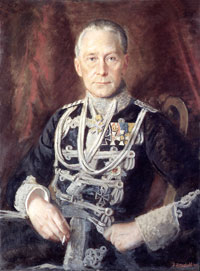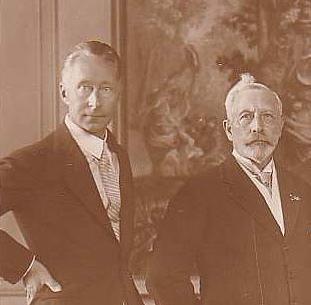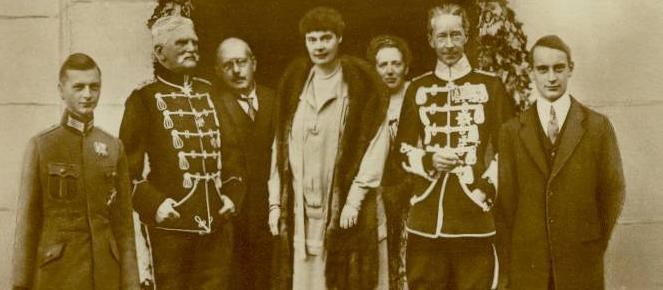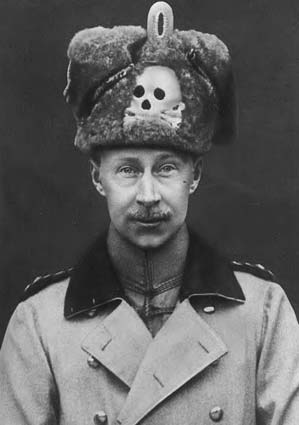Kronprinz Wilhelm
From Kaiserreich
Friedrich Wilhelm Victor August Ernst von Hohenzollern (born in Potsdam, Germany, on May 6, 1882), colloquially known as Wilhelm von Hohenzollern is the current German Kronprinz (Crown Prince) as eldest son of Kaiser Wilhelm II. He is the first in the line of succession to the German throne and would be known under the name of Wilhelm III.
Contents |
Biography
Born in 1882, six years before the accession of his father to the German throne. In 1888, Wilhelm went from being fourth in the Prussian succession line to first, becoming the German Crown Prince, or the Kronprinz. Raised within Prussian military circles, married in 1905 with Cecilie von Mecklenburg-Schwerin, and had the passager liner SS Kronprinz Wilhelm named after him: the ship was sunk in 1920 by a British vessel on the Eastern Atlantic. Assuming a few military command during the Weltkrieg, the Kronprinz had not really an influence on German politics after the Weltkrieg, except for his friends, General Fedor von Bock and General Kurt von Schleicher, and the role of protector of arts fulfilled by his wife. By now, the Crown Prince is a rather peaceful man, only waiting for his father passing away to accomplish his duty.
Personal life
Parents
The Kronprinz is the eldest son of Kaiser Wilhelm II von Hohenzollern and his first wife, Empress Augusta Viktoria von Schleswig-Holstein. Thus, he and his children are the first in line of succession for both German and Prussian throne. The Kronprinz appears to be ran by his own father: each time Wilhelm tried to intervene in German politics, the Kaiser forced him to be kept apart. An example among others: he failed to convince his father to name his friend Kurt von Schleicher as State Secretary for Interior for the von Papen government.
Marriage
In June, 6 1905, the Kronprinz married the youngest daughter of Grand Duke Friedrich Franz III von Mecklenburg-Schwerin, the Duchess Cecilie Auguste Marie von Mecklenburg-Schwerin, who was finally known as Princess Cecilie von Mecklenburg-Schwerin (born September, 20 1886). Despite the well-known unfaithfulness of his husband, she is known as a dignifed woman: Cecilienhof Palace, known as the shelter of most artists in Germany looking for a patron, such as famous architect Albert Speer, has been built for her.
Children
1. Prince Wilhelm (born Wilhelm Friedrich Franz Joseph Christian Olaf on July, 4 1906), second in line.
2. Prince Ludwig Ferdinand (born Louis Ferdinand Viktor Eduard Albert Michael Hubertus on November, 9 1907), still unmarried.
3. Prince Hubertus (born Hubertus Karl Wilhelm on December, 30 1909), still unmarried.
4. Prince Friedrich (born Friedrich Georg Wilhelm Christoph on December, 19 1911), still unmarried.
5. Princess Alexandrine (born Alexandrine Irene on April, 7 1915), mentally disabled.
6. Princess Cecilie (born in 1917), still unmarried.
Military career
Raised as his relatives and ancestors in the Prussian military tradition, he had just received a few command experience when he was given charge of the 5th Army in August 1914, leading this unit until November 1916, having his headquarters near Charleville (Ardennes). Thus, he participed to the Verdun offensive, successfully taking Fort Vaux: he later advocated for ending the bloodbath engineered by this senseless battle, only being fulfilled in September, 2 1916. He later led nominally the Germano-Austro-Hungarian offensive in Italy, becoming the first German officer to enter in Rome.
His major post-Weltkrieg achievements were to help his personal friend, Fedor von Bock, hero of the intervention in China, to become Generalfeldmarschall in 1935, and also launching the political career of General Kurt von Schleicher, main rival of current Reichskanzler Franz von Papen.
What would be his reign?
Unless he decides to claim another name, the Kronprinz will certainly reign under the name of Wilhelm III, placing him in the line of his great-grandfather Wilhelm I, unifier of Germany, and his own father...If he finally rules. Due to the early beginning and the longevity of his father's reign, the Kronprinz would be one of the oldest monarchs to accede to his throne: even if the Kaiser dies tomorrow, the Kronprinz is already a man in his fifties. Many experts are seeing his future reign more like a transitional reign, much like Friedrich III between Wilhelm I and Wilhelm II. That's why they are more interested about the Kronprinz's son: his eldest son Wilhelm who could renounce his rights due to his affair with a commoner, or his second son Ludwig Ferdinand, who turned away from the tradition of military education of the members of Hohenzollern family to make travels throughout the world and successful studies of law and economy.
A man of frivolous nature (whose affairs with hairdressers and ballet dancers were barely hushed up by the services of Imperial Family), despite a kind and quick-witted spirit, the gap between him and his father's authoritarianism will be astounding for the foreign diplomats. Unless he has to face a major crisis and resolve it, he will never have the same weight in history than his father, the Father of Mitteleuropa. His friend, General Kurt von Schleicher, is sometimes advocated as a possible Reichskanzler for him.
In short, Wilhelm III's reign will be peaceful, unless he has to deal with the rising threats against German powers.
Titles
His Royal Highness Prince Wilhelm of Prussia (1882-1888)
His Imperial and Royal Highness The German Crown Prince, Crown Prince of Prussia (1888-...)




